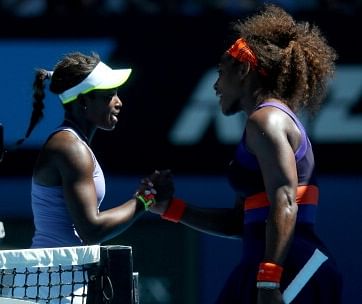
Serena's loss to Stephens: Changing of the Guard?
 Roger Federer‘s dramatic quarterfinal win over Jo-Wilfried Tsonga may have captured all the headlines, but the real story of the day happened much earlier. It’s not very common to see a player being such an overwhelming favorite at a tournament that holding the tournament at all seems pointless. And it’s even less common to see such a player being bounced out at the quarterfinal stage by a rank outsider. Serena Williams‘ loss to teenager Sloane Stephens wasn’t just an upset; it was a saga for the ages.
Roger Federer‘s dramatic quarterfinal win over Jo-Wilfried Tsonga may have captured all the headlines, but the real story of the day happened much earlier. It’s not very common to see a player being such an overwhelming favorite at a tournament that holding the tournament at all seems pointless. And it’s even less common to see such a player being bounced out at the quarterfinal stage by a rank outsider. Serena Williams‘ loss to teenager Sloane Stephens wasn’t just an upset; it was a saga for the ages.
After Serena rolled her ankle in the first set of her first round match (she went on to inflict a double bagel on her opponent despite hobbling all over the court), jokes went around that she was trying to do what 127 other women had no hope of doing: send herself packing from the tournament. When she hit herself in the face with her racquet while attempting a topspin forehand in the second round, the jokes got even more widespread. In one sense, though, this has always been the feeling about Serena: that she can only lose a match if she gifts it away to her opponent by playing below her level. No one could have predicted, though, that the jokes would become a self-fulfilling prophecy. When Serena hurt herself yet again in the second set of her match against Stephens today, this time while rushing the net to chase a dropshot, it proved one time too many.
It may be unfair to suggest that Serena only lost today because of her mid-match injury, but it can’t be denied that it did slow her down, if not for the entire match, then at least for a stretch of points between the middle of the second set and the start of the third. And even after she seemed to have recovered her lost step towards the end of the match, an obvious erraticism had seeped into her game. Her backhand, which is usually her stronger wing, kept coughing up routine errors, and her serve seemed to have lost its sting. As with any tennis match, there were a lot of factors that contributed to the result today, and Serena’s injury and inconsistent play were certainly among those factors. But they weren’t the only factors. There was, after all, a player on the other side of the net; a player who had the gumption and the ability to stay with Serena long enough to force her to self-destruct.
It would be an understatement to say that Stephens has been surrounded by a lot of media hype ever since she first burst onto the scene a couple of years ago. When her athleticism and her solid game started appearing in obscure WTA tournaments, she increasingly looked like the answer to all of America’s tennis prayers. The cupboard of talent in the US suddenly didn’t look so bare anymore; there was finally a player who seemed capable of carrying the mantle that would be left behind with the inevitable retirement of the Williams sisters. But deep down, everyone knew that they had to reserve judgment on Stephens; that the tendency of the American media to overrate homegrown players was perhaps as pervasive, if a little more subtle, than that of the in-your-face British media.
 The 2013 Australian Open has been the first real global exhibition of Stephens’ game. And now that she has reached her maiden Slam semifinal at the event, the question can’t be evaded any more: is Stephens the real deal? Her athleticism certainly is. Today, she was able to get herself in position to hit the ball back no matter how hard it came off Serena’s racquet, and she never looked hurried or in danger of being blown off the court the way most of Serena’s opponents do. She also has a solid serve, a power-packed forehand, and a very consistent backhand. Perhaps even more importantly, she seems to possess a natural court sense and the ability to make a sneak attack when given the opportunity – she won 18 of her 20 points at the net today, and looked comfortable with introducing variations in the middle of rallies. But most crucially of all, Stephens seems to have a stable tennis mind: she very rarely goes wrong with her shot selection, and when she was put in position to close out the match today, she showed remarkable composure in holding her nerve just long enough to eke out the break in the final game.
The 2013 Australian Open has been the first real global exhibition of Stephens’ game. And now that she has reached her maiden Slam semifinal at the event, the question can’t be evaded any more: is Stephens the real deal? Her athleticism certainly is. Today, she was able to get herself in position to hit the ball back no matter how hard it came off Serena’s racquet, and she never looked hurried or in danger of being blown off the court the way most of Serena’s opponents do. She also has a solid serve, a power-packed forehand, and a very consistent backhand. Perhaps even more importantly, she seems to possess a natural court sense and the ability to make a sneak attack when given the opportunity – she won 18 of her 20 points at the net today, and looked comfortable with introducing variations in the middle of rallies. But most crucially of all, Stephens seems to have a stable tennis mind: she very rarely goes wrong with her shot selection, and when she was put in position to close out the match today, she showed remarkable composure in holding her nerve just long enough to eke out the break in the final game.
On the flip side, Stephens does have the tendency to get a little too passive with her tennis. She was repeatedly being outhit by Serena towards the end of the match – not because lack of firepower in her own arsenal, but because of her refusal to be more forceful with her groundstrokes. She can also occasionally get a little careless with her footwork; when she’s put under pressure, she sometimes stops making all those little adjustments she normally does to get in perfect position to hit her shots. And that leads, naturally, to errors. She made as many as 39 unforced errors today, and while that number is forgivable considering she won the match, it is still worryingly high.
Some people have also questioned whether Stephens has the intense, burning desire – a trait so strikingly evident in the top 3 female players today – to script a Slam-winning career. While that may be a legitimate point, the lack of an overbearing desire to win may actually make Stephens a more adored star than is the norm in the women’s game (if she does reach stardom levels, that is). Throughout the tournament, she has consistently charmed the crowds in her on-court interviews with her easygoing nature and sparkling sense of humor. Today, when asked how she felt on defeating the player whose poster she had in her bedroom, Stephens replied, to roars of laughter from the crowd, “I think I’ll put a poster of myself now”. This, of course, came just a couple of days after her already famous quote about not spending her prize money too extravagantly because she “didn’t want to be old and broke”.
That Stephens achieved her first breakthrough win over her compatriot and role model made this upset all the more poignant. It is tempting to look at this match as a changing of the guard; the mentor handing over the reins to the pupil who is ready to shoulder the burden of responsibility. Serena, of course, would vehemently disagree with that line of thought – I’m almost certain that, far from looking at this loss as a sign of her inevitable decline, she’s already furiously plotting ways to re-establish her brutal dominance over the rest of the women’s field. And as impressive as the teenager has been at this tournament, I’m inclined to side with the latter line of thought. Had it not been for Serena’s injury, Stephens would probably not have made it this far. The changing of the guard is still possible, but it didn’t happen today.
The jury may still be out on whether Stephens is about to become the next superstar of women’s tennis. But for now, as she sprints her way through her matches and charms her way through her interviews, you can only sit back and enjoy the refreshing spectacle of a young tennis player doing what sport is supposed to really be about: enjoying yourself.
It is only fair that Sloane Stephens, at the age of 19, is allowed to enjoy herself.